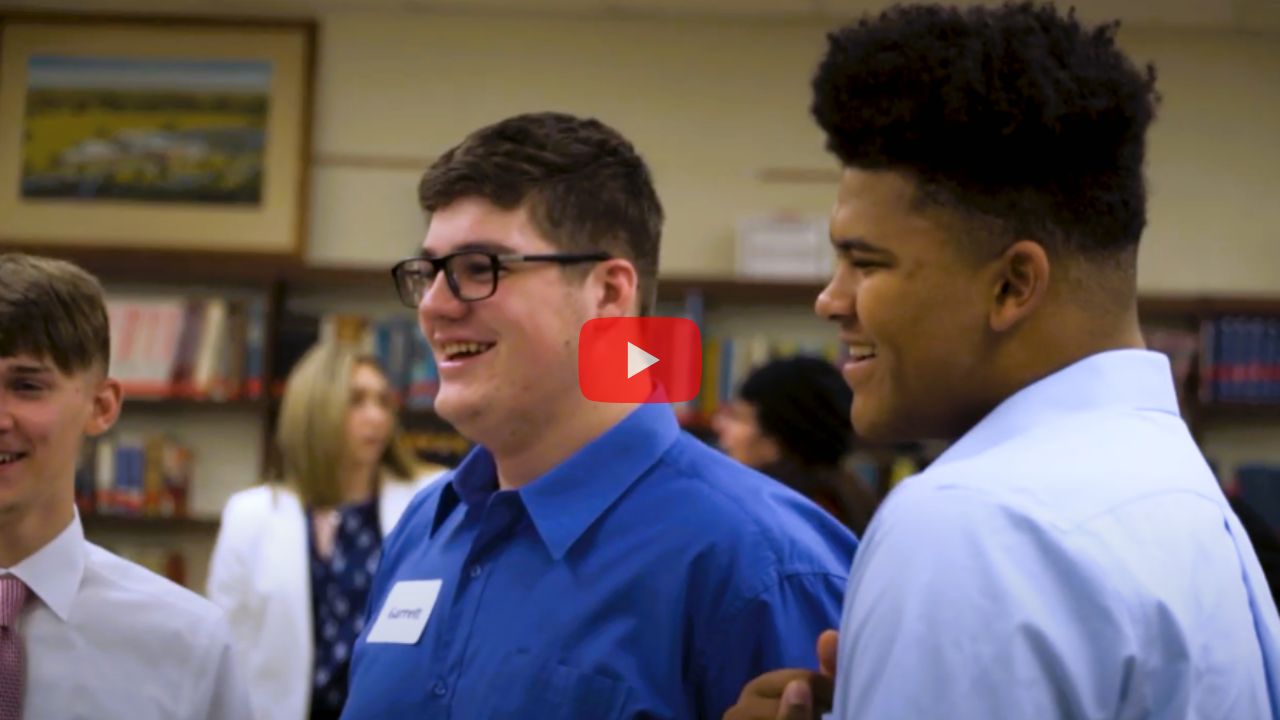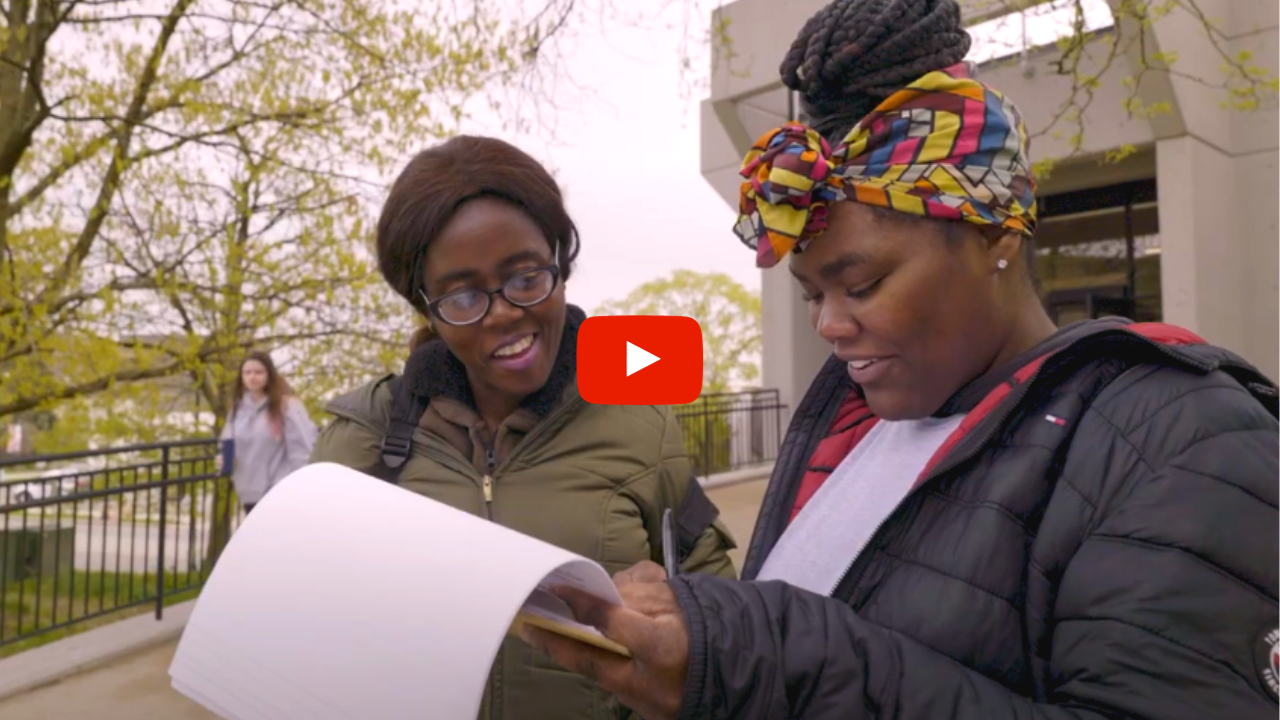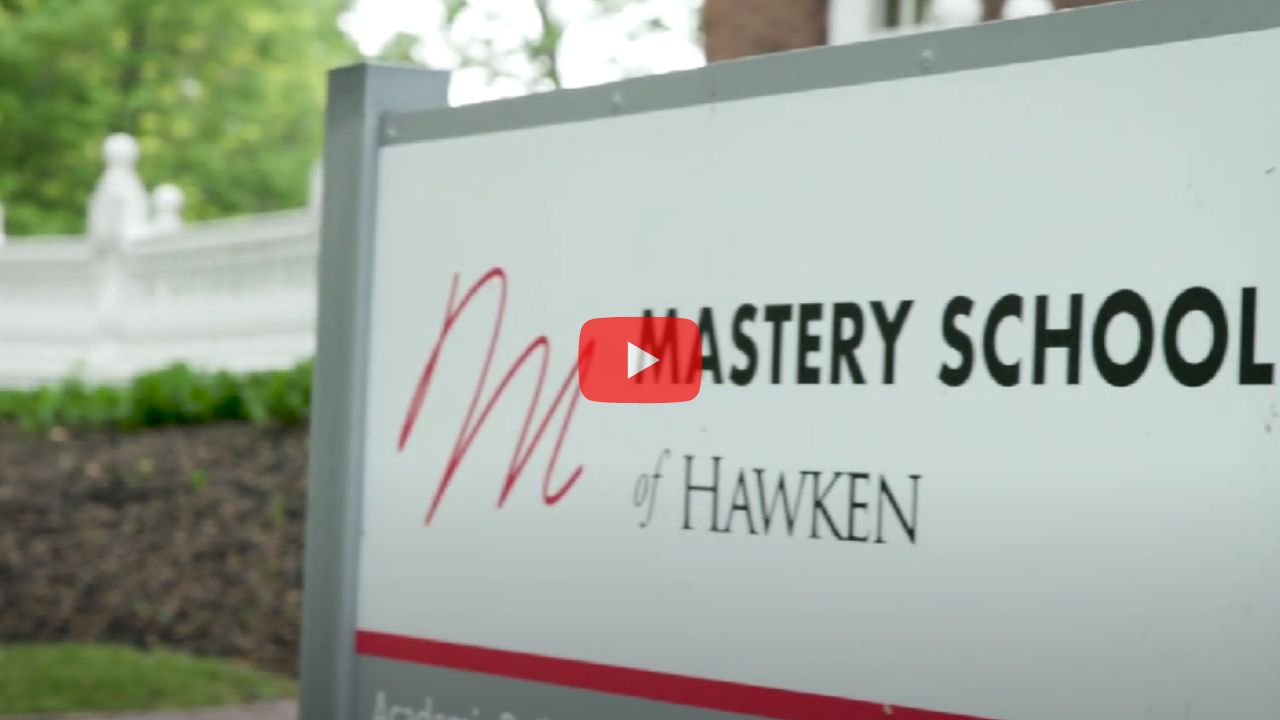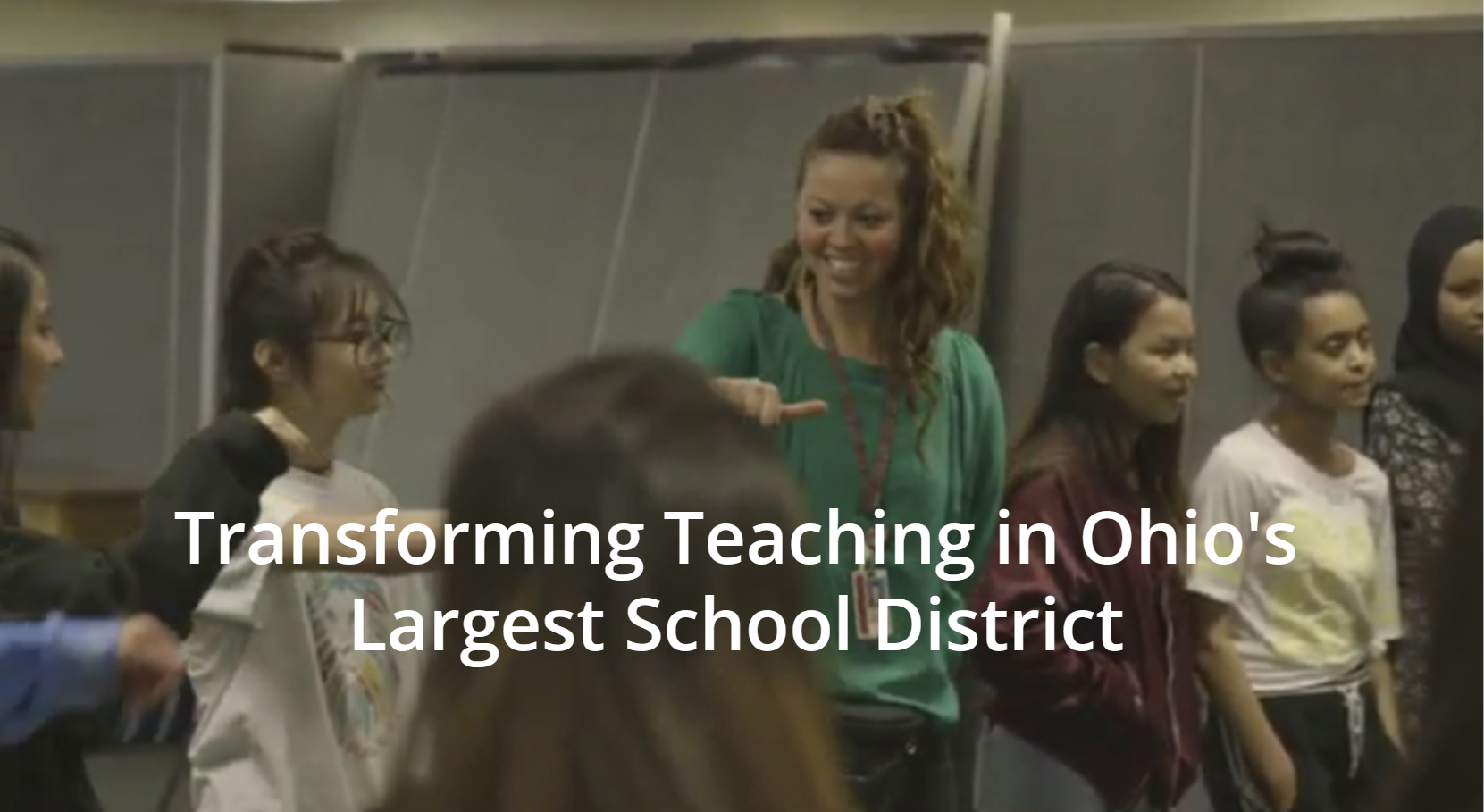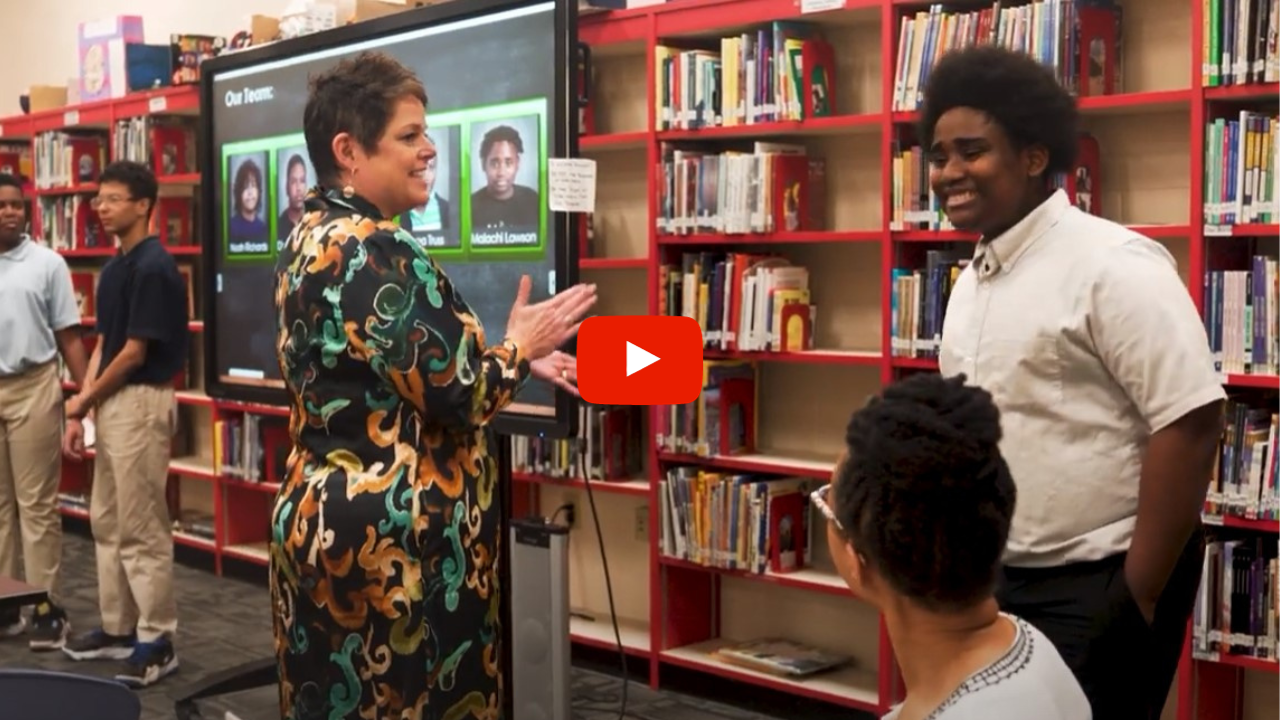In this episode, learn how the feedback we give in this course goes far beyond a letter grade. Doris and Alison discuss how students shift away from extrinsic motivation through self-reflection, as well as giving and receiving feedback.
Alison: Hey, Doris.
Doris: Hi, Alison.
Alison: How are you?
Doris: I’m good. How are you today?
Alison: Good.
Doris: It’s a beautiful day in Cleveland, Ohio.
Alison: It sure is.
Doris: Yeah, it is, it’s really…
Alison: Nice fall day. Yeah. What I was a little anxious to talk a bit about today was the one-to-one feedback…that you’ve been doing with the students at this point in the course. I think it’s a really interesting moment, some interesting shifts that happened, and I was hoping we could dive into a bit of that conversation.
Doris: Oh, yeah. Oh, yeah, it’s been such a full week I forgot that I… But this first one, the first one-on-one feedback the students get, which comes after they finish their first complete…they’ve completed their first business challenge, is always a huge milestone for the students. It’s funny how we hear consistently from students afterwards that that was a huge turning point for them, having that one-on-one feedback. And I think that the reason is that they’re about four or five weeks in so they now really understand what this experience is about, what this class is about, what the work looks like, what the learning is about.
And we have seen enough of them to be able to have a lot to talk about. And yet they’ve never really had anyone… What they say over and over, they’ve never had anyone talk to them about them in this way, and so it gets them, you know, in this course where part of the curriculum, a big part of their curriculum, is how to collaborate, how to team, and it isn’t just philosophy, it’s real curriculum. We have real things we have them do, we have real work they have them do, we have real…
So they’ve already, for four or five weeks, been immersed in work that has them understanding and identifying their strengths, strengths they probably didn’t focus on before and now are so important in this class. We’re having them very explicitly and thoughtfully identify and consider and understand the strengths others bring to their work and to the team. They’re starting to really understand what we’re talking about when we say it’s not about the sum of the parts, it’s about the whole. By the way, I think that’s the first time I’ve said that right. I didn’t botch that in… Do you think I said it right?
Alison: I don’t, actually, but I’m not the one to know that either.
Doris: You don’t? Oh, okay, because I never say it right.
Alison: I think it’s “The whole is greater than the sum of its parts.”
Doris: But isn’t that what I said upside-down?
Alison: Yes.
Doris: Okay. Anyway…
Alison: We’re both terrible at idioms.
Doris: We’re terrible. I mean, I have years worth of idiom dictionaries as gifts that are useless. But anyway, yeah. So they’re starting to get that. They’re starting to get it, and the way I word this, and it’s not perfect but it’s the only thing I’ve come up with so far, is that this whole thing we’re talking about, understanding your strengths, understanding how to develop them, how to apply them, how to be generative with them, how to do the same with others, etc., is really an academic discipline.
I mean, we’re not approaching it as this personal, touchy-feely, let’s have group talks and cry. It’s a very…for lack of a better word, it’s a professional exercise. All right, the quality of your work and the success of your project and your team is going to depend on your ability to not just know what you have to bring but to use it really well. How do you use what you bring to the table really well and how do you use what others are bringing to the table well? So there’s nothing personal or, you know, the teenagers aren’t getting all sensitive and feeling criticized, which is a fabulous thing.
So these feedbacks…I’ve been going on and on but I wanted to set the context, because then when you have these one-on-one feedback sessions with these students for the first time, what they experience in that session is there’s a ton to talk about, to talk about them, how they’ve performed well, how they need to do things differently going forward, what they’d like to improve, what is the growth they’d like to do, and they’re all in. Instead of a teacher saying, “I’m now giving you a grade of an 82 and here’s all the stuff you missed,” it’s entirely different. It’s, “Hey, let’s talk about how you did on the last one and I wanna start by asking you, student, what are you experiencing? What are you seeing? What do you think you did really well? Where do you think you need to grow? What are your goals going forward?”
And it’s a very productive session. And they come out of the session realizing, “That was really helpful. I want to do more of that.” And it’s a way of interacting with students and teenagers and, as you know, I did this, whatever I teach, for 21 years. It’s a way of interacting with students that not only helps them focus on the places where they can grow, but it leaves them, every single one of them, with a total complete internalized optimism. It’s not about, “What did you miss? Oh, you blew it. I’m sorry, your grade…maybe you can pull it up to a B.” Or, “You’re doing A-level work. Keep it up, kiddo. Hope you can complete with an A.” It’s none of that. It’s about, “Okay, how cool. You’ve got another go at another project and another team. What are some things you want to develop in yourself?” They love that.
Alison: It’s pretty powerful. I mean, watching you work with the students in the way that you do, I notice they move to this different level of self-awareness that’s pretty powerful for anyone, let alone someone at a very fragile point in their life where they’re trying to figure out their identity and who they are and what they stand for, what they care about in the world, and to have another figure in their life, have a meaningful conversation with them about the kind of growth they’re interested in doing. I don’t think a lot of adults think about the type of personal growth they’re interested in having, whether it’s in their professional or personal lives day-to-day.
So to have a really dedicated space at 17 years old to sit there and really reflect and think about, “Wow, yes, these are the things I would like to reach,” or, “These are the things I’d like to improve upon as I’m working with my team. I’d really like to create more space for others,” or, “I’d really like to be more confident and more vocal,” or, “I’d like to show, actually, that I am very creative and I’ve been holding that back.” There’s things that come out in those sessions that allow them to reflect in the moment but also develop strategies with you. You’re very helpful, I think, in talking them through how to bring that into a team or into the work that they’re doing.
Doris: And in order for it to be productive, I have to be really direct and real with them. And the other thing… So there’s no question that it’s a tough thing, this first session, for a lot of the students.
Alison: Even before you start. I remember they say, “Well, how long are these gonna last?”
Doris: They’re scared. People come in and say, “Okay, I heard these are really tough. I’m really scared.” I mean, I had a number of kids this time come in and say…looking really nervous, and I had said “How are you?” Like, really scared and… But here’s what happens. You have 15 minutes or so and you’ve now seen a lot of this student and you can spend the 15 minutes talking about how they did on the first one and maybe saying, “Well, you know, you didn’t really get into any depth here,” or, “You didn’t do this very well,” or, “You really didn’t show up in these ways,” and you can spend 15 minutes in this back-and-forth that we’re used to at schools, right, where the teacher says “Well, you didn’t this and you didn’t that,” and then the student defends themselves and says, “Yes, I did.” But it’s not productive. There’s nothing productive about it.
So I kind of rip the Band-Aid at the beginning and I say, “All right, Alison, let’s face it. You didn’t do a whole lot on the first one. It’s a weird class, you hadn’t been through it, blah blah blah. Sometimes you did your homework, sometimes you didn’t, but let’s be real. You didn’t do a whole lot. You didn’t go very deep on it. You didn’t this.” And Alison may tear up and get upset and want to defend whatever, but we kind of dispense with that really quickly because it doesn’t matter. It’s over, it’s not productive. And then we say “Okay, let’s talk about what you’re doing now.” I very quickly get to, “Let’s talk about what you’re doing now. What are your goals?”
First, I’ll say something like “How’s this class going?” And they’ll say whatever. “What are your goals for yourself? Let’s talk about this next one. What are you blah blah blah? Talk to me about it. Do you care?” Very often with some of the students, like, “Do you care about Shanice, not Shanice so much personally but her mission, what she’s trying to do, the filter that is going to filter out pathogens and allow people in perhaps developing countries who are aid workers to go to far reaches where there isn’t any fresh water?” You know, “Do you care about it? Do you think it matters?” So we have, with some of them, work like that. And then we get to the point where we’re like, “Okay, so you didn’t do so much on the first one. You get what this class is now. Here you got another one. Yes, you care about it. Let’s talk about what you can do. Let’s talk about…”
Alison: How are you gonna approach this?
Doris: Yeah, “How are you gonna approach this?” And I don’t actually give space, and some of them try very hard to make the conversation about them giving excuses for whatever they didn’t… I’m very quickly like, “It doesn’t matter, okay? We can argue about whether you did or you didn’t, doesn’t really matter. Let’s talk about what you’re doing next and moving forward.” And so the whole thing should and mostly does leave them in a place where it’s not about the feedback session, it’s about where they are. It leaves them in a place where they’re like, “All right. Here’s what I’m gonna do on this next one.”
And interestingly, and this is really interesting given that we’re in a competitive college prep, you know, private school where the kids have a lot of pressure and they’re…interesting… And these are first semester seniors, so the grade pressure’s crazy, and interestingly enough, I did not have a single, single question or comment in any of those feedback sessions about grades, even though I was giving them their first grades in the class. I start by giving them, “Here’s the rubric, here are your grades, blah blah blah,” shove it aside and say, “Okay, let’s talk about you.” Isn’t that so funny?
Alison: It’s pretty power… I mean, that moment when you slap those down and you say, “These are your grades. Moving on, this is what actually matters. Let’s talk about you.” That you shift that for them where it quickly makes it a neutral. You neutralize it in that way where they realize, “Okay, yeah, we can go on and on and I could defend myself to maybe get a couple more points in the whatever category of the rubric, or we could actually talk about me.”
Doris: Right. And to be fair, what I actually do, to be very clear, I start by showing them the grades. I say “Here’s the rubric, here’s how it works,” I show them how it works, I show them their grades in the different… “These are your grades for your team, four different categories. Everybody on your team got those. These are your individual grades, dah dah dah.” I give some, “Here’s why I gave you these grades,” and then I say, “Does this make sense to you?” And they say, “Yes,” and then I shove it aside. I also say, sometimes when I remember, I say, “If you would like to discuss the grades further, we can do that, but we have so much time, so it’s up to you and we can do that if you want.” But then I say, “Does this make sense to you?” And they all, every one of them this time said, “Yes,” shoved it aside and…
Alison: That’s awesome.
Doris: Yeah. And this week’s interesting too because the work that they’re doing, they’re at an interesting point in this challenge. So it’s very complicated, it’s very science-heavy, it’s very world-heavy. They have to learn a lot about developing nations, about water, about natural disasters, about access to water, about…
Alison: Pathogens, all types of diseases…
Doris: Pathogens, various populations, well-resourced, under-resourced, various countries with economies and infrastructure. They’re learning a crazy amount and they’re at very different places, the four teams. And one of the things, you know… I worked yesterday with a young woman who’s creating a curriculum around refugees in Europe for European kids, public schoolers. And one of the things that came up with her, which is relevant in many… At one point, she suggested that at the end of the classes, the program that she’s creating for these middle school kids who are going to solve problems for Syrian refugees, she asked, “Should there be a competition? Should we have a competition?” And I said, “You know…”
Alison: We’re at the end of the experience. Teams are pitching against one another or something.
Doris: Right. And there are winners and all this other stuff. And I said, “I would strongly, strongly urge against it and I would urge you to never bring competition into it.” And, you know, in our case this week, one of the ways that that came up, because when the kids do their weekly share-outs, the teams to us, we used to have the teams do these share-outs in front of each other for educational reasons. And what started happening is the teams started holding back what they were sharing because they didn’t want to give away…it started to become competitive. And so we changed it to the way we have it now where each team presents to us along the way alone. At the end, they’ll all see each others’. But any competition or ranking that you build into the program as a teacher, in my experience, changes everything.
Alison: And why is that?
Doris: Because these are kids, and the minute it’s a competition and there’s somebody who’s best, somebody who gets the A, other people who get the Bs, “I want the A. She got a B,” then that becomes the focus, that becomes the objective, that becomes the goal, and that becomes, more importantly, the measure of success. And every student has very different growth to do in this class, in any class, in any experience, as kids, as people, and the minute you start deciding you’re going to rank order growth and you’re gonna rank order progress, you go back into the same problems that we have because of our structures in education now. It’s a deficit-based system. This is an entirely strengths-based approach, which is a very personalized approach. This is a personalized educational approach.
And yes, we have to give grades, I would love not to because they actually end up not mattering, because what the students soon discover is the real meat in terms of evaluation, assessment, feedback, performance doesn’t show up in an 82 or an 86 or a 92. It shows up in the work, in the experience that the kid is showing. “Look how I problem-solved. Look how I handled this. Look what I’ve been able to develop. Let me show you my work,” which is really the evidence that has to be considered. And the minute you try to put some kind of ranking thing in, you see it. The minute you put it in there, you see the kids all change into their usual mode, which is, “Tell me what I need to do to get that award,” the A, or this. “Tell me what I need to do to get…” or the, “You’re the best team.”
Alison: To win.
Doris: “Your solution was better than anybody else’s and here’s why.” The minute you do that, all the wonderful things that are happening to each individual kid in this who’s got their own challenge and it’s personal and they have their own path for their learning and their growth, the minute you do that, it changes everything.
Alison: Well, it really puts more importance on the product versus the process.
Doris: Exactly.
Alison: Like you always say.
Doris: It’s about the process, not the product. And you’re exactly right. That makes it about the product. And any teacher, when they’re thinking about, “Should I give an award for this? Should I do a this for this?” Bite your lip and think hard before you do it. And if in doubt, don’t. If in doubt, don’t.
Alison: Absolutely. There’s a lot of interesting things packed into where we are in this course at this moment, and it’s exciting to watch the students moving to this place of more awareness, more depth, really digging into the challenge, sinking their teeth into all the meat that’s here, but doing it in a way where they are consciously creating their learning experience. They’re starting to do that themselves. But now after these conversations they’ve had with you, they recognize, “Oh, these are moments I need to push my team a little bit harder,” or, “I need to, myself, start to synthesize in a different way than I have before.” And it’s very cool and I’m anxious to hear more from any of our listeners out there about ways that they have had opportunities to do this with their students. If, in the Facebook group, people want to drop that in, I think it would be an interesting dialogue to continue, how we can create these kinds of experiences that help students to reflect more and become more aware.
Doris: That reminds me, I need to put into that Facebook group…I told you about a week ago I saw Terry Chou’s class.
Alison: Oh, that’s right.
Doris: Okay, her science class. Terry came to our first workshop, she’s a science teacher at a public middle school in California. She’s developed, coming out of it, a class where you walk into the room, and these students are on fire about what they’re working on and they’re learning science in a way that is crazy, crazy energized.
Alison: All based on your method.
Doris: Yeah, but… Yes, and Terry has taken that and she’s a fabulous teacher and what she’s doing with those kids, it’s just very, very cool. She’s won Innovative Teacher of the Year awards and all that stuff. But the reason I bring her up is that, and I’m glad you mentioned the Facebook group because I need to put it in there, the reason I bring it up is I was there for the afternoon, I was there with her students, they were showing me what they were doing, they were all excited, I saw their proposals for products they wanna build to solve a problem that blah blah blah. I didn’t see any evidence, I’m sure there are, I’m sure she has to give grades, I didn’t hear or see anything about that. I heard the excitement from… The students were showing me, “Look what we built,” and it’s what you want.
Alison: That’s right.
Doris: It’s what you want.
Alison: That’s exciting work.
Doris: Yeah, it’s exciting.


